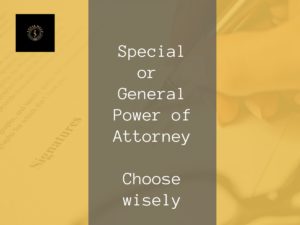 In the world of technology, business and industry, contracts and agreements play an important role. At present it is necessary for the businessman to depend on others for getting his things done. Power of attorney is a legal document, which gives power to the attorney holder. By giving Power of Attorney to someone is gives them the right/power to carry out certain specific financial and legal businesses on their behalf. The relationship between the two parties is similar to the relationship of Principal and agent. It is common among NRIs, for example, to give Power Of Attorney to someone they can trust and to represent them to carry out their businesses in India since it is difficult for them to travel frequently in the country of their origin.
In the world of technology, business and industry, contracts and agreements play an important role. At present it is necessary for the businessman to depend on others for getting his things done. Power of attorney is a legal document, which gives power to the attorney holder. By giving Power of Attorney to someone is gives them the right/power to carry out certain specific financial and legal businesses on their behalf. The relationship between the two parties is similar to the relationship of Principal and agent. It is common among NRIs, for example, to give Power Of Attorney to someone they can trust and to represent them to carry out their businesses in India since it is difficult for them to travel frequently in the country of their origin.
Power of Attorney is of two types, a special Power Of attorney and a general power of attorney.
Special Power Of Attorney:-
A Special power of attorney is given to the agent for a specific purpose and time. An agent can be engaged in legal business on behalf of the grantor until the principal dies. Once any of the events happens i.e. death of the principal or if he is mentally incompetent to act, the power of attorney ends. The power of attorney is used in cases where the principal is disabled or because of his illness or is not present to sign necessary legal documents for financial transactions. In a special Power Of attorney only a specific power is given by the executor. The special power of attorney holder cannot use the power beyond the attorney. For Example an NRI has given a special power of attorney on his behalf to his relative for representing him on his behalf in the court for his matter. Than in the spa it will specifically be mentioned that the relative is only allowed to represent the executor on his behalf and he is not allowed to do anything else with the property. It is to be noted that a Power of attorney has to be registered at the Sub-Registrar’s Office to get a legal validity. Also important thing to note here is that a Power of attorney remains valid only till the life of the principal. Within lifetime one can revoke the Power of attorney. A special power of attorney gets revokes on its own as soon as the specific transaction for which the SPA executed is completed.
General Power Of Attorney:-
A General Power of Attorney grants all the powers to the person wherein the person to whom the general power of attorney is given will be answerable as well as accountable to all the acts done by him on behalf of the executor/principal person. In a general power of attorney gives the attorney the authority to make decision which is not in specific manner and can be manage the principal’s properties, including buying and selling real estate mortgaging, leasing for the principal or developing the properties and obtaining licences and permissions as required etc. The most important thing to consider is appointing the reliable and right person while handing him over a general power of attorney. NRI’s (Non-resident Indians) who cannot be physically present in India to manage their property or carry out sale or purchase transactions of their properties, mostly use it. In a general power of attorney no specific purpose is mentioned here. But in a special power of attorney only limited powers are given to the agent. If you are giving general power of attorney to someone to handle property matters, then one should exclude the right to sell or mortgage the property. Allowing someone to sell your property via Power of attorney carries big risk. Many of property frauds have done on the basis of general power of attorney. Such a Power of attorneys must be registered and the powers that are being handed over to any person must be clearly written out. A general power of attorney is revoked through Revocation Deed, which is stamped & notarized in a same manner as it was issued. It is important to issue a legal notice and public notice after the revocation deed is made. It is for the information of the attorney holder & general public about the revocation.
For a NRI following are the steps that must be taken for issuing a Power Of Attorney.
- It has to be notarized by a Notary Public with the photos affixed and photo should also be half stamped.
- Thereafter the Special Power Of Attorney has to be stamped from the Indian Consulate/High Commission.
- A copy of the passport has to be notarized.
- Affidavit needs to be notarized by a notary public with the photo affixed on it.
